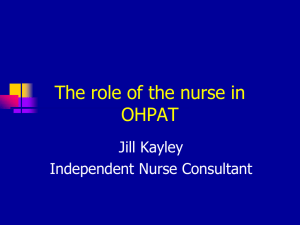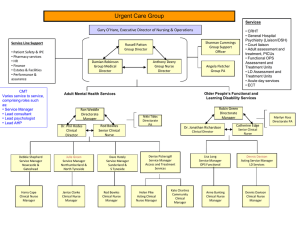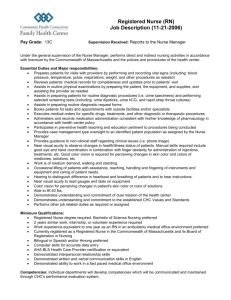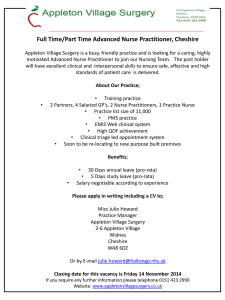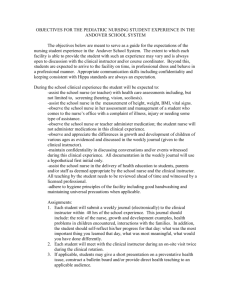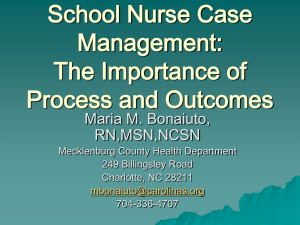File
advertisement
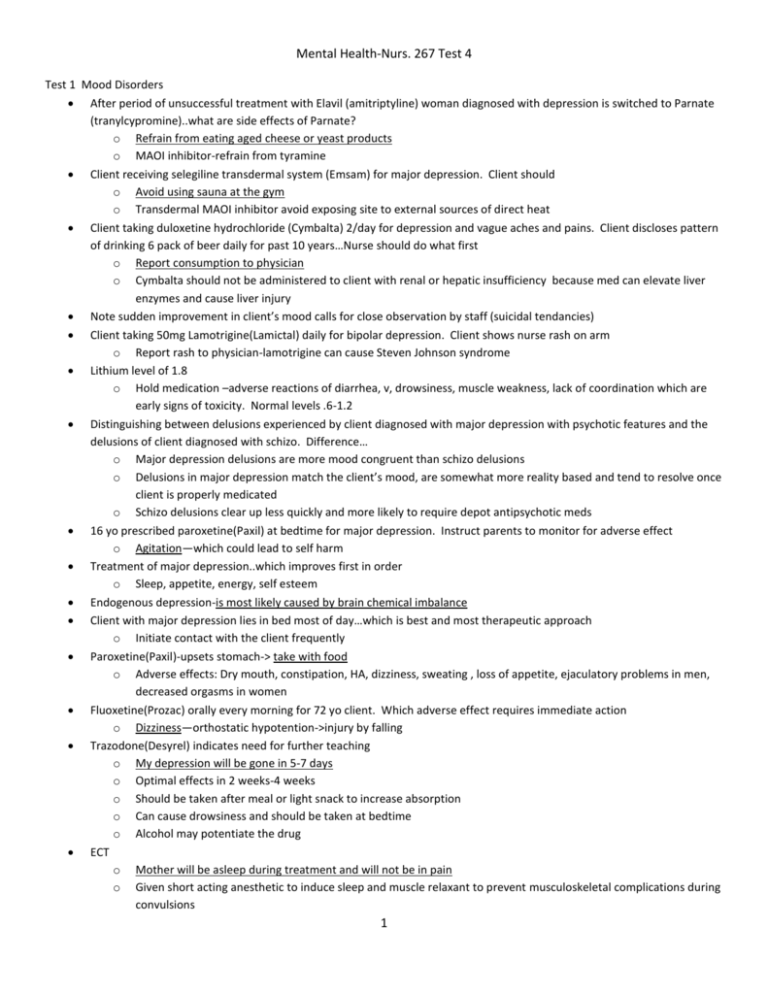
Mental Health-Nurs. 267 Test 4 Test 1 Mood Disorders After period of unsuccessful treatment with Elavil (amitriptyline) woman diagnosed with depression is switched to Parnate (tranylcypromine)..what are side effects of Parnate? o Refrain from eating aged cheese or yeast products o MAOI inhibitor-refrain from tyramine Client receiving selegiline transdermal system (Emsam) for major depression. Client should o Avoid using sauna at the gym o Transdermal MAOI inhibitor avoid exposing site to external sources of direct heat Client taking duloxetine hydrochloride (Cymbalta) 2/day for depression and vague aches and pains. Client discloses pattern of drinking 6 pack of beer daily for past 10 years…Nurse should do what first o Report consumption to physician o Cymbalta should not be administered to client with renal or hepatic insufficiency because med can elevate liver enzymes and cause liver injury Note sudden improvement in client’s mood calls for close observation by staff (suicidal tendancies) Client taking 50mg Lamotrigine(Lamictal) daily for bipolar depression. Client shows nurse rash on arm o Report rash to physician-lamotrigine can cause Steven Johnson syndrome Lithium level of 1.8 o Hold medication –adverse reactions of diarrhea, v, drowsiness, muscle weakness, lack of coordination which are early signs of toxicity. Normal levels .6-1.2 Distinguishing between delusions experienced by client diagnosed with major depression with psychotic features and the delusions of client diagnosed with schizo. Difference… o Major depression delusions are more mood congruent than schizo delusions o Delusions in major depression match the client’s mood, are somewhat more reality based and tend to resolve once client is properly medicated o Schizo delusions clear up less quickly and more likely to require depot antipsychotic meds 16 yo prescribed paroxetine(Paxil) at bedtime for major depression. Instruct parents to monitor for adverse effect o Agitation—which could lead to self harm Treatment of major depression..which improves first in order o Sleep, appetite, energy, self esteem Endogenous depression-is most likely caused by brain chemical imbalance Client with major depression lies in bed most of day…which is best and most therapeutic approach o Initiate contact with the client frequently Paroxetine(Paxil)-upsets stomach-> take with food o Adverse effects: Dry mouth, constipation, HA, dizziness, sweating , loss of appetite, ejaculatory problems in men, decreased orgasms in women Fluoxetine(Prozac) orally every morning for 72 yo client. Which adverse effect requires immediate action o Dizziness—orthostatic hypotention->injury by falling Trazodone(Desyrel) indicates need for further teaching o My depression will be gone in 5-7 days o Optimal effects in 2 weeks-4 weeks o Should be taken after meal or light snack to increase absorption o Can cause drowsiness and should be taken at bedtime o Alcohol may potentiate the drug ECT o Mother will be asleep during treatment and will not be in pain o Given short acting anesthetic to induce sleep and muscle relaxant to prevent musculoskeletal complications during convulsions 1 o Atropine given before to decrease salivation Reaction formationo Client tells nurse she was fired from boss a month ago, but he was a wonderful boss and he was understanding and really nice o Best response by nurse-tell me more about having to work while not being able to sleep or concentrate Client is depressed and need of grooming and hygiene. Most appropriate response by nurse o Stating to the client that it is time for him to take a shower Sertraline (Zoloft) o Can cause delayed ejaculation o SSRI o Don’t cause weight gain, but may cause loss of appetite and weight loss o Dry mouth is side effect, but temporary o Don’t take with st. johns wort-severe reaction could occur Client with recurrent depression-involve the client in usual at home activities Client with severe depression is being discharged home. Most important for nurse to review with client o Medication management with outpatient follow up Being gravely disabled is criterion for being legally committed (client thinks bowels are jelly so he wont eat) Venlafaxine (Effexor)-takes 2-4 weeks to be fully effective Client taking citalopram (Celexa) and St. John’s wort. Which indicates developing serotonin syndrome o Confusion, restlessness, diaphoresis, ataxia, HA, myoclonus, shivering, tremor, D, N, abd. Cramps, hyperreflexia Foods to avoid while taking phenelzine(Nardil)—salami o MAOI inhibitor o Avoid pickled, fermented, smoked or aged foods—hypertensive crisis Nardil o Client has throbbing HA Take vital signs—hypertensive crisis s/s ->stiff or sore neck, N, V, sweating, dilated pupils and photophobia, nosebleed, tachycardia, bradycardia and constricting chest pain, occipital headache Which behaviors exhibited by client with depression should lead nurse to determine client is ready for discharge o Verbalization of feeling in control of self and situations Wellbutrin taken for 5 days in client with major depression-monitor for suicide attempts Which outcomes should nurse include in initial plan of care for client with psychomotor retardation, withdrawal, and unresponsiveness… o Client will interact with the nurse Imipramine(Tofranil)-TCA-nurse tell client to avoid o Alcohol- will produce additive CNS depression o Causes photosensitivity so use sunscreen and protective clothing when exposed to sun o Reduced lacrimation may occur as side effect-artificial tears may be recommended o May cause tachycardia, cardiotoxicity—ECG required TCA adverse effects o Anticholinergic-urine retention and blurred vision o Dry mouth constipation, tremors, cardiac arrhythmias, and sexual dysfunction, hypotension Doxepin(sinequan)-taken for depression o May cause ortho hypo—TCA Mirtazapine(Remeron)-bedtime for depression o Give as prescribed-given at bedtime due to postural hypotension and sedative effects o Usual dosage range is 15-45 mg Client taking escitalopram (Lexapro) daily for past 2 weeks for severe major depression-monitor for 2 o Suicidal ideation Dysthymia is a milder persistent type of depression in which sufferers are able to minimally carry on their work. Psychotherapy can usually bring improvement with less likelihood of the need for medication Bipolar Disorder-manic phase Client has right to refuse medication despite her involuntary admission Use of prednisone or other steroids can initiate a manic state in a bipolar client even if he is well controlled on medication Client has increased agitation, and nurse tries to diffuse anger but not working…what next o Medicate the client Irritable mood is a symptom of mania Reminding client of past consequences of stopping meds may help them realize the risk of stopping med again Give haldol with lithium until lithium has therapeutic levels Thought content “I am the queen of England” in Axis I diagnosis of bipolar disorder Client laughing and telling jokes to group of clients, then crying and talking about death in family, then laughing and joking again…nurse should o Ask client to come to quiet area to talk to nurse individually o Decreasing external stimuli is the intervention most likely to decrease the emotional lability and minimize its effect on other clients Client talking to other clients about sexual encounters..what should nurse do next o Tell client others may not want to hear about sex, and invite him to play a game of ping pong Client is having delusions…he is prince of peace, but others will come and take him away. Client is looking around room. Nurse does. o Lets walk around the unit for a while o Distracts the client from the paranoid grandiose delusion that could result in loss of control Client in manic phase experiences insomnia and potential exhaustion Bipolar manic phase-is a result of an imbalance of chemicals in the brain Lithium level 1.8-call physician, hold next dose and push fluids Serum lithium level drawn every 3-4 months-to prevent toxicity related to drug therapeutic range (page 707) Blood lithium levels drawn before breakfast Lithium toxicity-muscle weakness, vertigo, vomiting, extreme hand tremor and sedation Lithium side effects-nausea, fine hand tremors, anorexia, increased thirst and urination and diarrhea or constipation Valproic acid (Depakene) for client with bipolar disorder who has achieved limited success with lithium o Teaching-drowsiness and upset stomach are side effects o Anticonvulsant, used as a mood stabilizer o Client not to drive or perform tasks requiring alertness and take med with food or milk or eat frequent small meals o Serum level (50-100ug/ml) Anhedonia-the inability to experience pleasure Client taking carbamazepine(Tegretol) o Call physician to report symptoms of chills sore throat, fever because theyse symptoms may be sign of serious adverse effects of med-hepatic, hematologic, cardiovascular Client acutely manic and very anxious begins to pace, bump into furniture and preach loudlyo Administer haloperidol (haldol) ordered prn Suicidal Ideation and Suicide attempts Using a gun is most lethal methods of suicide First question to ask client “r u thinking about hurting yourself Goal of safety is priority Question to determine the seriousness of client’s suicidal ideation “ how are you planning on harming yourself?” Discuss behavioral clues with suicidal client’s family and resources that can help 3 Client states that she feels self doubt and powerlessness and is very dependent on the nurse. Erikson’s stage of growth and development is in which stage o Autonomy versus shame/doubt Client diagnosed with paranoid schizo-going to college-most important item nurse to address at this timeo Potential for med noncompliance Stagger 15 minute checks so client cant predict the precise time for suicidal clients Talk with nurse when suicide thoughts occur 7 day supply of Tofranil on discharge due to potential overdose 4 Test 2 Schizophrenia, other Psychoses and Cognitive Disorders Client states provocative sluts of world-ask the client to inform the staff if she has negative thoughts about other clients Schizophrenia talking about “I would like to go out and do things again-nurse response-what activities did you enjoy in pastknowing the clients interests is the best place to begin to help the client resocialize Client leaves group and goes to room-nurse after group ask the client to talk to the nurse about her concerns-it is appropriate to talk to client alone about concerns Client has increasing mood swings..his diagnosis changed to schizoaffective disorder and asks the nurse “so now what” My risperidone is just not doing the job-nurse->with your mood swings, you may need to take a mood stabilizer along with your Risperdal Client reports having thoughts of being followed by foreign agents who are after his secret papers-what is appropriate nurse response with clients disturbed thought process->”I think these thoughts are frightening to you o Disturbed thought process-nurse should acknowledge that the thoughts are frightening to client. Telling client the nurse does not see any foreign agents is an appropriate response if client is having Disturbed Visual sensory perception and visual hallucinations o Telling client the nurse does not understand what the client means is appropriate response if client has impaired verbal communication Client suddenly jumps up, begins pacing and wrings hands. Order the nurse for interventions from first to last o Walk with client to decrease anxiety o Share observations about her anxiety related behaviors o Ask client about sources of her anxiety o Discuss productive ways to solve her problems causing anxiety Client is receiving haloperidol decanoate. He complains of stiff muscles, restlessness, and internal jumpiness. Which med would be most appropriate for nurse to administer to decrease symptoms o Benztropine mesylate (Cogentin)-anti Parkinson medication o Trazodone-antidepressant used to enhance sleep o Olanzapine is antipsychotic med which could aggravate EPSE o Lorazepam-antianxiety Paranoid schizo admitted 4 days ago o Simple tasks that require concentration and effort, including activities involving self care, may be difficult for client especially during acute phase of illness o Relapse typically occurs with med noncompliance, vulnerability to stress, low threshold for stress, number of stresses, and client’s lack of adaptive coping behaviors contribute to relapse Paranoid schizo-client states I am being followed, its not safe…area of mental status exam should nurse document this infor: o Thought content—answer o Client is voicing paranoid delusions of being followed and monitored o Presence of delusions is described in area of thought content in mental status exam o Insight section of exam->nurse would document info reflecting lack of insight..for example, statements such as I don’t have a problem o Judgment section-nurse would document info reflecting lack of judgment for example, poor choices such as buying a gun for self protection Client diagnosed with schizo –wife visits 2 days after admission of husband and states “why is he not eating. He still thinks his food is poisoned o Nurse->education about her husband’s meds is needed Expecting absence of delusions by end of client’s second day is unrealistic. Nurse would reasonably expect delusions to decrease by 5-9 days after hospitalization 5 Client states she hears God’s voice telling her she needs to punish herself..response of nurse o Please tell staff when you think you need to punish yourself Client experiencing command auditory hallucinations. It is important for staff to know if she currently thinks she needs to punish herself Client complaining of blurred vision after 4 days of taking haloperidol (haldol), benztropine (Cogentin), quetiapine (Seroquel), and buspirone (BuSpar). Which med would nurse suspect as most likely cause the adverse affect o Benztropine-blurred vision o Quetiapine, (atypical antipsychotic) and buspirone, an anti-anxiety agent do not cause blurred vision o Haldol may cause blurred vision but more commone with Cogentin Client diagnosed with paranoid schizo is still withdrawn, unkempt and unmotivated to get out of bed. Aid asks why fluphenazine,Prolixin, 10mg for 7 days has not helped o Prolixin is most effective with positive symptoms of schizo—answer o Haldol-most effective with positive symptoms of schizo o Client has negative symptoms Client taking chlorpromazine (Thorazine)-most affective teaching o Avoid going out in the sun without a sunscreen with SPF of 25 o Constipation is also an adverse affect of drug o Postural hypotension is also adverse affect Teaching for Clozapine (Clozaril) o Need for weekly blood tests o Associated with agranulocytosis o Causes constipation—eat high fiber diet o Has anti-cholinergic affects o Postural hypotension o Sedation may occur o Sialorrhea-excessive saliva is adverse affect Client suspected of having auditory hallucination…..nurse should o Ask “what are you hearing right now?” Client is hearing voices of aliens telling him to eliminate himself…nurse should o Tell staff when you hear these voices Client with paranoid schizo is taking atypical antipsychotics Olanzapine (zyprexa) and risperidone (Risperdal) o More effective than older meds in treating negative symptoms of schizo because of Dopamine and serotonin receptor blocked Client taking Risperdal for several months. Reports that she stopped drinking 4 days ago. Hallucinations of bugs crawling on skin…..Cause o Alcohol withdrawal o Alcohol and Risperdal have an additive affect Newly admitted client diagnosed with paranoid schizo is pacing rapidly and wringing hands. He state that another client is out to get him..Then he states Protect me, select me, reject me….nurse should o Administer his oral PRN lorazepam (Ativan) and haloperidol (Haldol) o Clang association o Client is not threatening others at this point Client is aware that he is experiencing auditory hallucinations as result of his paranoid schizo. At this point, which is most appropriate response for nurse o What seems to help make the voices less bothersome o Because client is aware that he is having auditory hallucinations, nurse should help client take active role in trying to control them Client comes to hospital with flat affect, confused, disheaveled,…nurse should 6 o Help client feel safe and accepted (initial priority)\ Parent of young adult client with paranoid schizo is asking questions about his son’s antipsychotic med Ziprasidone (Geodon). Which statement needs further teaching o I should give him benztropine to help prevent constipation from ziprasidone o Benztropine can be prescribed for restlessness and stiffness o Drowsiness and dizziness are adverse effects of ziprasidone o Ziprasidone-does help improve the negative symptoms of schizo such as avolition Symptoms of neuroleptic Malignant syndrome (NMS) o High temperature o High temp also seen with muscular rigidity, tremors and altered consciousness o Needs immediate attention Olanzapine (Zyprexa) causes weight gain—nurse should help with diet and exercise to keep weight down Ziprasidone (Geodon) causes less weight gain than other atypical antipsychotics o Better absorbed when taken with food, so bedtime snack Older clients take 1/3 or 1/2 the meds of younger people Client being switched to Risperidone long acting injection (Risperdal Consta). He is to remain on his oral dose for of Risperdal daily for appx. 1 month. The client states “I didn’t have to take pills when I was on fluphenazine(prolixin Decanoate) shots in past: nurse should tell o Risperdal Consta initially takes a little longer to reach ideal blood levels Client diagnosed with dressing or grooming self care deficit related to apathy. Nursing outcome expected by end of day 4 o Perform showering and dressing for herself Risperdal-used to improve clients positive and negative symptoms of schizo. When evaluating effectiveness on negative symptoms, nurse should see improvement in o Apathy affect, social isolation o Positive symptoms-hallucinations, delusions, illusions, and ideas of reference, agitation, aggression, hostility Client diagnosis Defensive coping secondary to suspiciousness states” my wife and coworker are conspiring against me” nurse should expect outcome for ND o Accurately interpret the behaviors of his wife and co-worker Action by nurse that will increase delusional clients anxiety—whispering with others where client can observe Client with undifferentiated schizo tells nurse he doesn’t have anywhere to go and he doesn’t know anyone in apartment where he’s staying. Most beneficial for client at this time o Nurse arranges for client to attend day treatment at the clinic Client with chronic undifferentiated schizo has positive and negative symptoms of schizo but does not meet criteria for paranoid, disorganized, or catatonic schizo. Based on the interpretation of this info, nurse should expect client to exhibit which symptoms o Auditory hallucinations and asocial behaviors o Grossly disorganized speech and behaviors-disorganized schizo o Hallucinations and persecution thoughts-paranoid Chronic undifferentiated schizo (CUS) o Negative symptoms are more prominent—Risperidone is given to help control negative symptoms o Negative symptoms don’t respond to traditional antipsychotics such as Haldol or Thorazine Aripiprazole (Abilify)—adverse effects—new antipsychotic drug o HA that will subside in few weeks o Transient mild anxiety o Insomnia Client receiving haloperidol (Haldol) for 2 days develops muscular rigidity, altered consciousness, temp of 103 and trouble breathing on day 3..interprets 7 o Neuroleptic malignant syndrome Client reports to nurse that he does very little all day except sleep and eat..nurse should o Help client set up a daily activity schedule to include setting a wake up alarm Client sitting in chair has not gotten up in 1 hour. Client does not respond to verbal directions and arm has been extended over chair for 30 minutes…nurse should do what next? o Give prn ordered doses of Haldol and lorazepam o Client is exhibiting catatonic behavior, an acutely serious result of severe anxiety and psychosis Goal for chronic undifferentiated schizo who has been withdrawn from friends and family for 3 weeks o Attending day therapy 3/week Client becoming less verbal, less active, less responsive to directions and more stuporous during home visit..client needs o Hospitalization—becoming catatonic Client has been well maintained on olanzapine (zyprexa) for 1 year. Clients mother died, he was found in yard with no clothes on, loose association of words…nurse should intervene first by o Addition of short course of haloperidol (Haldol)-fast acting medication and stress has decreased effectiveness of zyprexa Client admitted with diagnosis of schizo affective disorder, manic phase, who is currently taking fluoxetine (Prozac), valproic acid (depakote), and olanzapine (zypresa) as ordered has increase in manic symptoms in past week. Psychiatrist orders valproic acid blood level drawn at once…rationale of this order o Decrease in the level of valproic acid could explain the increase in manic symptoms Primary cause of relapse and rehospitalization o Noncompliance with medications Mental health professionals are concerned about care of chronically ill clients who have aging parents…reason o Parents are commonly providing financial support and housing Discovery of biochemical hypothesis for the cause of schizo has helped families of ill clients by o Professionals are more likely to view families as allies than as villains Developing discharge plan for client before complete stabilization of symptoms , nurse should ensure client will have o Many coordinated services Client with chronic mental illnesses need to develop trust in their care providers and learn about their illness and treatment nurse should develop a care plan for : o Diligent monitoring of med. Compliance Most common reason for med non compliance is adverse effects. When teaching the families, what need should the nurse identify as the greatest o Alternative ways to manage the adverse affects Cognitive Disorders o Client in group reminiscing about past. Nurse should expect this to have what kind of effect on the clients functioning in the hospital o Decrease the clients feelings of isolation and loneliness Delirium Commonly due to medical condition such as UTI in elderly Often involves memory problems, disorientation, and hallucination When assessing client with delirium, which condition Is most important for nurse to investigate o Prescription drug intoxication Develops over period of hours to days, the nurse should assess delirium as distinguishable by which characteristics o Disturbances in cognition and consciousness that fluctuate during the day Critical to determine the underlying cause or condition or illness Short term goal in 2-3 days-> regain orientation to time and place Dementia 8 Namenda and Aricept are commonly used together to slow progression of dementia Ensure safety of client while walking the halls, nurse should assess the client’s gait for steadiness Agnosia-result of vascular dementia-she is staring at eating utensils without trying to eat. Nurse should o Hand the fork to client and say Use this fork to eat your green beans o Agnosia-lack of recognition of objects and their purpose Client uses vulgar language—ignore the vulgarity and distract client Motor apraxia-relates to decline in motor patterns essential for complex motor tasks. However client with severe dementia may be able to perform… o Brush teeth when handed a toothbrush Alzheimers Loss of short term memory but still have long term memory Best rationale for encouraging day treatments (early alzheimers) o Client would benefit from increased social interaction Client with alzheimers with moderate impairment, type of care nurse should include o Prompting and guiding activities of daily living Donepezil(Aricept)-this medication is most affective in early stages of disease Physician orders Risperdal for client with alzheimers. The med helps decrease following behavior o Agitation and assaultiveness Minimize stress by maintaining consistency in environment, routine, and caregiver 9 Test 3-Personality disorders, Substance related disorders, anxiety Disorders, Client has borderline personality disorder and inflicting cuts …nurse asks the client o Do you have a plan for suicide Client diagnosed with personality disorder, nurse plans to assist the client with o Specific dysfunctional behaviors Client with paranoid personality disorder hospitalized for physicllythreatening his wife because he suspects her of having affair..what approach should nurse employ o Matter of fact o Creates a non threatening and secure environment because client is experiencing problems with suspiciousness and trust o Use of ” I “ statements and responses would be therapeutic to reduce the clients suspiciousnessness and increase his trust in staff Personality schizotypal disorder…help client become involved with others by o Attending an activity with the nurse Client complaining about not being allowed food in her room..nurse should o Set limits on the behavior Antisocial personality disorder who has a potential for violence and aggressive behavior..short term outcomes accomplished o Discuss feelings of anger with staff Client stealing from his boss at work and diagnosed with antisocial personality disorder…he states”its not a big deal”…nurses response… o Are you having any guilt feelings at all? o Client diagnosed with an antisocial personality disorder is manifesting behavior indicative of problems in Erikson’s stage of initiative versus guilt. o Typical behaviors of a client with antisocial personality disorder are engaging in illegal activites, violating the rights of others, lack of guilt or remorse, recklessness, impulsiveness, aggressive behavior and irresponsibility in work and with finances Client with antisocial personality disorder has history of stealing and jail time. Nurse should include in plan of care… o Teaching the client consequences of actions Client has history of using angry outburst when frustrated and begins to curse at nurse during an appointment after being informed she will have to wait..nurse response o I will not continue to talk with you if you curse Indicates improvement in client with avoidant personality disorder o Interacting with two other clients Client with borderline personality disorder-have unrealistic and exaggerated perception—splitting-defined as the inability to integrate good and bad aspects of an individual and the self, is a hallmark behavior of client and sees himself and others as all good or all bad Client with avoidant personality disorder is timid, socially uncomfortable, withdrawn and hypersensitive to criticism Clients with personality disorders are accepted although their behavior may not be Client with antisocial pers. Disorder is discussing social activity behavior acceptable without being seductive..nurse focus on o Explaining the negative reactions of others toward his behavior Client states he can get executive position with best company around anytime he wants…client has high school education…clients statement is example of o Grandiose self-importance What is best approach when dealing with client diagnosed with narcissistic personality disorder when discrepancies exist between what client states and what actually exists o Supportive confrontation-increases responsibility for self 10 Client with histrionic personality disorder is melodramatic and responds to others in exaggerated manner…recommend which of following activities o Role playing-teach client appropriate response to others in various situations Client with major depression and borderline personality disorder..nurse should ask first o Suicidal thoughts? Alcohol related disorders Client admitted with alcohol withdrawal..nurse should help client become sober by o Provide client with quiet room to sleep in Client discharged from an alcohol rehab program on clonazepam (Klonopin). Several months later he reports having insomnia, shakiness, sweating and one seizure…nurse should first ask client o Has he stopped taking Klonopin suddenly (benzo withdrawal) o Symptoms of sedation if client was taking alcohol with meds Nurse asks how much client drinks, how long the client has been drinking and when was last drink to help nurse determine which o Severity of withdrawal symptoms Client states that she is feeling better as symptoms of alcohol withdrawal abate. She refuses info about alcohol rehab and states “I don’t have a problem”..the nurse should respond by o Discussing how alcohol has gotten her into trouble Client experiencing alcohol withdrawal exhibits tremors, diaphoresis and hyperactivity..pulse 92, high BP..nurse should administer o Lorazepam (Ativan)-benzo substitute suppresses withdrawal symptoms o Cogentin-treats EPS Vital signs indicate physiologic response and effectiveness of med for alcohol withdrawal Most helpful by nurse in reducing coworker’s denial about alcohol being a problem o Yu have alcohol on your breath Husband asks what he should say to his alcoholic wife in group to facilitate his wife’s entrance into treatment o Either you get help or the kids and I will move out of house Action that is contraindicated for client who is experiencing sever symptoms of alcohol withdrawal o Helping the client walk Client takes Disulfiram(Antabuse) statement that needs further teaching o I can drink one or two beers and not get sick while on Antabuse o Info on Antabuse Metallic or garlic taste in mouth is normal Take at bedtime-makes client sleepy Client on Antabuse becomes nauseated and vomits severely. Nurse should ask first o How much alcohol did you drink today? Thiamine for client being treated for alcohol addiction prevents development of Wernicke’s encephalopathy Client sees no connection between liver disorder and alcohol intake-denial Client with alcohol dependency is prescribed a B complex vitamin-nurses response most appropriate o The vitamin is a nutritional supplement important to your health o B complex vitamins produce a calming effect on the irritated CS and prevents anemia, peripheral neuropath, and Wernicke’s encephalopathy No caffeine for client in withdrawal Client with alcohol dependency has peripheral neuropath o Avoid use of electric blanket Nurse plan of care for client with alcohol withdrawal delirium o Remain with client when she is confused or disoriented o Injury or unintentional suicide is a possibility when client attempts to get away from hallucinations 11 Client being discharged from alcohol rehab. Program..priority discharge plan o Follow up care Dual diagnosis for major depression and substance dependence---there will be simultaneous treatment of addiction and depression Priority for daily assessment in client with bipolar disorder and alcohol dependency is --mental status client diagnosed with schizo and alcohol abuse drinks alcohol with buddies. Nurse interprets this as o decision to use alcohol is a wish to feel accepted by others Other addictive substances overdose of Vicodin, client has chronic back pain…nurses response that is most appropriate o your pain will be controlled by tapering doses of propoxyphene (Darvon-N) with other pain management strategies and medicines client overdosed on heroin. RR=9…causes CNS depression o respiratory depression and arrest is pr4imary cause of death among clients who use opioids. o PNS effects associated with opioid abuse include Urinary retention, hypotension, reduced pupil size, constipation and decreased gastric emptying, biliary and pancreatic secretions Pinpoint pupils are a sign of opioid overdose Opioid withdrawal (heroin) o Rhinorrhea o Diaphoresis o Piloerection o Yawning, chills, tremors, restlessness, irritability o Leg spasms, bone pain, diarrhea and vomiting o Symptoms of withdrawal occur within 36-72 hours and subside within a week Therapeutic response to narcan o Increased respirations and increased consciousness Vomiting and diarrhea are late signs of heroin withdrawal o Late signs –continued…muscle spasm, fever, N, repetitive sneezing, abd. Cramps and backache o Early signs-yawning, tearing, rhinorrhea, sweating o Intermediate signs of heroin withdrawal Flushing piloerection, tachycardia, tremor, restlessness, and irritability Methadone usage is helpful for opioid addicts because –it allows client to work and live normally Best measure to determine client’s progress with rehab o The number of drug-free days he has Should lead nurse to suspect client addicted to heroin o Hypoactivity Client took overdose of barbiturates and is comatose..nurse should assess for respiratory failure Client diagnosed with Situational low self esteem ..which is most appropriate initially o The client will discuss her feelings related to her losses Nurse is peaking to 6th graders about marijuana. o Tell students that drug causes more damage to your body than regular cigarettes Ecstacy o Is similar to using speed o Is used at raves o Candylike pacifiers are used for teeth grinding o It can cause death o It reduces self-consciousness o 12 LSD-client sees sounds and hears colors. He has elevated vital signs and mild paranoia..nurse should o Decrease stimuli, monitor vs every 30 minutes, talk reassuringly to help with relaxation o Administer lorazepam (Ativan) if anxiety increases Client with cocaine overdose is experiencing delusions, hallucinations, mild respiratory distress and mild tachycardia..nurse should do. o Place seizure pads on bed o Admin PRN haldol as ordered o Monitor for respiratory acidosis o Encourage deep breathing o Monitor metabolic acidosis Client ran out of crack..no money…nurse should access for suicidal ideation Client with amphetamine psychosis. Nurse should o Place seizure pads on bed, monitor cardiac and respiratory status, admin Haldol IM as ordered, transfer client to psychiatric unit Client wants to get off of Xanax the most accurate answer by nurse o Instead of Xanax, you will take lorazepam (Ativan) in decreasing doses and frequency over a period of 3-4 days o Haldol is not effective for benzodiazepine withdrawal Client overdosed on PCP…assess for violent behavior Cranberry juice should be given for client intoxicated on PCP to hasten excretion of the chemical Nurse should assess client with possible alcohol poisoning for substance use of Marijuana because Marijuana masks the symptoms of nausea and vomiting Client with cocaine dependency is irritable, anxious, highly sensitive to stimuli, and over reactive to clients and staff on unit…most therapeutic for client o Providing frequent time outs-reduces possibility of escalating behaviors and violence Client with symptoms of amphetamine psychosis that are improving is anxious and still experiencing some delusion…nurse should o Invite client to play game of ping pong with nurse Anxiety Disorders Diazepam (Valium) o Consult with health care provider before stopping drug o Take med with food o Don’t use alcohol o Stop taking drug if he experiences swelling of lips and face and difficulty breathing o Used for short term only Client is pacing and wringing his hands and states “I just need to walk” ..therapeutic response by nurse o Are you feeling anxious? Teaching to client about panic disorder o Symptoms of panic attack are time limited and will abate Client with panic disorder is taking alprozolam (Xanax) o Blocks the symptoms of panic because of action of increasing neurotransmitter Gamma-aminobutyrate (benzodiazepine) Effexor o Is a SNRi antidepressant and will take 2-4 weeks to be affective Alprazolam (Xanax)-avoid alcohol (benzo)-additive depressant affects Buspirone (BuSpar) o Nonbenzodiazepine anxiolytic is effective in treating the cognitive symptoms of anxiety such as worry, apprehension, difficulty concentrating and irritability 13 o Therapeutic effects in 7-10 dys o Can be taken with food o Not known to cause physical dependence Client being discharged with acute stress disorder…referred to outpatient clinic for followup. Most important for client to use for continued alleviation of anxiety o Using adaptive and palliative methods to reduce anxiety Client with acute stress disorder tells urs she has feelings of anger toward rapist…nurse suggests writing a journal to express her feelings Client with PTSD needs to find new housing and wants to wait for month before setting another appt. to see nurse. Nurse interprets this action as o A necessary break in treatment When taking benzodiazepine, don’t combine with antacid-decreases the absorption rate Valium (benzo) cant be stopped abruptly..withdrawal symptoms are similar to alcohol withdrawal Client has agoraphobia without panic disorder. Behavioral therapy is most effective for this illness Nurse should walk with client down hall to group room who has agoraphobia OCD has been taking sertraline (Zoloft) but would like to have more energy every day. Don’t combine St John’s Wort with Zoloft because it can cause a serious reaction called Serotonin syndrome OCD-compulsive behavior to relieve anxiey Client with social phobia moves to another area when someone sits next to her. nurse should convey awareness of the client’s anxiety about being around others Somatoform disorders Client diagnosed with conversion disorder has a paralyzed arm o Pushing insight into the disorder will increase client’s anxiety and the need for physical symptoms Client has nausea (somatization disorder) when wife asks for divorce. Nurse should o Direct the client to describe his feelings about the impending divorce Ethical standards are higher than those required by law 14 Test 4-Stress, Crisis, Anger, and Violence Client demonstrates moderate anxiety regarding a pending medical procedure. Nurse should minimize anxiety o Providing a brief explanation and then doing procedure quickly A 75 yo client is given instructions on glucose testing and states he cant remember all this stuff. Nurse should recognize the clients response is related to moderate to severe anxiety To reduce moderate anxiety about surgery-nurse should explain surgical procedure to client and what happens before and after surgery Nurse should see which cognitive characteristic of mild anxiety o Accurate perceptions Nurse should expect which psychomotor behavior indicating a panic level of anxiety o Suicide attempts or violence is psychomotor response o Desperation and rage is emotional response o Loss of reasoning and loss of contact with reality are cognitive responses Mild anxiety motivates client to focus on issues and resolve them. Learning and problem solving can occur at mild level of anxiety Taking control for client is reserved for near panic level of anxiety Severe anxiety interferes with reasoning and functioning-reduce stimuli and pressure is crucial Tension reduction is appropriate at moderate levels to help client think clearly and engage in problem solving Low levels of anxiety, the primary focus of interventions is on learning and problem solving When coping becomes dysfunctional to require being admitted, nurse should assess the client for ability to demonstrateminimal functioning with new problems developing When teaching assertiveness and problem solving skills, nurse should also address client’s ability to use conflict resolution skills On-going assessment, nurse should identify client’s thoughts and feelings about a situation is addition to whether the client’s behavior is appropriate in the context of current situation Short term goals with clients who are inpatients, most realistic o Client will write a list of strengths and needs Long term goal for client with cancer who has anxiety-solve problems without help from others Cognitive behavioral model-substitution of rational beliefs for defeating thinking and behaving Defense mechanism for displacement-“now when I am mad at my wife, I talk to her instead of taking it out on the kids Compensation-focusing on athletic achievement versus academics, highlighting ones strengths instead of weaknesses Repression-unconsciously not remembering Suppression-consciously not remembering Which of the following is a crucial goal of therapeutic communication when helping the client deal with personal issues and painful feelings o Conveying client respect and acceptance even if not all the client’s behaviors are tolerated With shorter lengths of stay becoming norm, which statement is true of the stages of nurse-client relationship o Different phases of the relationship involve emphasizing different processes and goals related to client needs Client may have fears about failing. Which intervention is most likely to facilitate change o Practicing new behaviors with the nurse Clients coping with physical illness 18 yo diagnosed with leukemia, most important short term goal for nurse and client o Expressing his angry feelings to the nurse Colostomy club member meets with client before surgery for purpose of o Providing the client with support and realistic info on the colostomy Client in Crisis Girl states she has been “hooking up “ with her boyfriend. Nurse response… o Describe what you mean by hooking up 15 40 yo client is anxious and says she would rather die than be pregnant. Most helpful nurse respone o I see your upset. Take some deep breaths to relax a little A true crisis state, involving a period of severe disorganization is difficult to endure emotionally and physically. Nurse recognizes that a client will only be able to tolerate crises for 4-6 weeks Nurse incorporates the underlying premise of crisis intervention, about providing the right kind o help at the right time. To achieve o Regaining emotional security and equilibrium Client attempted suicide after receiving divorce papers. Which statement indicates to the nurse that the client is ready for discharge o A list of support persons and community resources Client in crisis center states “I have tried everything to get thru this but nothing is working. Help me!” nurse uses crisis intervention of o Emotional management Clients having problems expressing anger Client taking assertive training class. Which behavior indicates client is becoming more assertive o Asks his roommate to put away his dirty clothes after telling the roommate that this bothers him Fear of harm is expected as a response to anger from others When client is about to lose control, extra staff come to help commonly stay at a distance from the client unless asked to move closer by the nurse who is talking to client. Which best explains the rational for the distance initially o The client is likely to perceive others as being closer than they are and feel threatened Use of a full length restraint blanket is required when the client is at risk for injury from fighting the restraints Interpersonal Violence Most important indicator of goal achievement before discharge of a client with history of violence toward others o Verbalization of her feelings in an appropriate manner Client loses control and throws 2 chairs at another client. Nurse should use restraints and administer an IM tranquilizer When committed involuntarily, the right to leave hospital is lost Client can be removed from restraints when he demonstrates self control 16 Test 5 Mental health problems of children, adolescents and family Client suspected of abuse describes that she is a proud wife and mother just like her own mother. Nurse interprets this family pattern as o Role stereotyping Safety plan is most important to include when client is being abused Child who is suspected of being abused-wears long sleeve shirts and long pants even in warm weather Client has been a victim of crim. Nurse is aware that recover depends on the ultimate goal of o Regaining a sense of security and safety Client has been raped but did not report to police. After determining whether the client was injured and whether to file a report, the nurse’s next priority is to offer crisis intervention It is important to remind rape victim periodically that she did not deserve and did not cause the rape Coercion as a result of the trusting relationship is often used in young children who are sexually abused Preadolescent is suspected of being sexually abused because he demonstrates self destructive behaviors and attempted suicide o Truancy and running away are also common behaviors Adolescents and adults who were sexually abused commonly mutilate themselves o Use of physical pain to avoid dealing with emotional pain Play therapy for young child who has been sexually abused and is having difficulty putting feelings into words Being a member of a large family is least likely to be a risk factor for child abuse Parents suspected of abusing child-have difficulty controlling aggression Profile of high risk parents for abuse is o Isolated, impulsive, impatient and single with low self esteem, history of substance abuse, lack of knowledge about child’s normal growth and development and multiple life stressors While interviewing a 3 year old girl who has been sexually abused about the event..most effective approach would be to o Play out the event using anatomically correct dolls Which of the following observations by nurse should suggest that 15 mo old has been abused o The child is underdeveloped for his age Low self esteem is a factor that is common parental indicator of abuse Eating disorders Client with anorexia is taking diet pills rather than complying with diet. Nurse should do first o Listen to client about fears of losing control of eating while being treated Anorexia described as-intense fear of becoming obese, emanciation, and disturbed body image Primary group for anorexia is between 12-20 yo females Clients with anorexia appear to be a model child with no problems Client comes to clinic with abdominal pains. Friend indicates client has unhealthy eating pattern of large amounts of carbs and junk food with few fruits and her stomach is upset a lot o Refer the client to mental health clinic and physician Long term goal for bulimia-manage life stresses without bingeing or purging Client tells nurse she only eats excessively when upset with her best friend and then vomits. o Nurse should enroll client in coping skills group Nurse should focus on helping girls accept and appreciate their bodies and feel good about themselves to prevent 5 th grade girls from developing eating disorders in their teens Child and adolescent behavioral problems 15 yo who smokes marijuana and drinks alcohol around peers and to achieve social acceptance. Highest priority to help him maintain sobriety o Peer recognition that does not involve substance use ADHD treatment plan will include psychostimulant meds such as methylphenidate (Ritalin) and behavior modification or Cylert (med) 17 Be alert for child giving away valued personal items –attempt of suicide 7 yo with Tourette syndrome. Priority for nurse to assess o Multiple motor and verbal tics Comparing s/s of depression of children versus adults o Adults commonly display sad behaviors, while children have more somatic complaints and possible acting out behaviors Suicidal risk in children and adolescents requires nurse to know o The risk of suicide increases during adolescence, with those who have recently suffered a lose, abuse or family discord being most at risk 5 you understanding of death o My mommy died last week, but I am going to see her againo View death as reversible Aspergers disorder (child) o Is recognized later than autism, and interpersonal interaction problems typically become more apparent when child begins school 14 yo diagnosed with oppositional defiant disorder. Observed on unit kissing two male clients o Discuss with client when and where it is acceptable to kiss boys o Reinforcing that kissing and touching other clients is not allowed ADHD is more common within families, but there is no evidence that problems with parenting cause this disorder Children with oppositional defiant disorder o Be consistent with discipline while assisting with ways for the child to more positively express anger and frustration 15 yo sent to school nurse with dizziness and nausea. Nurses response o Tell me everything that you have had to eat and drink yesterday and today ADHD-between 1/3 and ½ of children experiencing ADHD and taking meds will need to continue to take them as adults Give single dose form of Ritalin early in the day (10-14 hours before bedtime) Behavioral contract for client with conduct disorder o Take prescribed meds o Acceptable method for expressing anger o Consequences for unacceptable behaviors o Rules for interacting with staff and other clients 18
